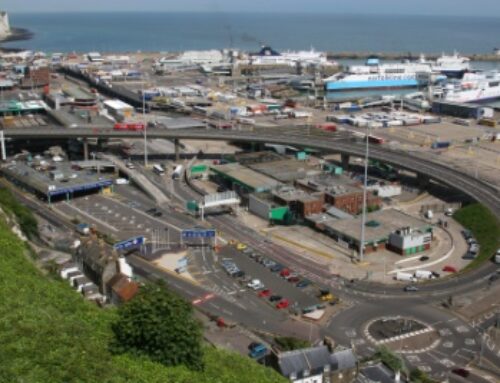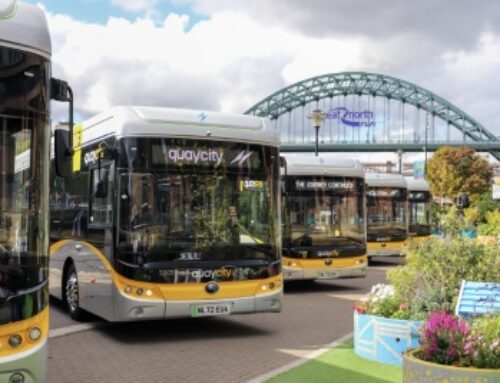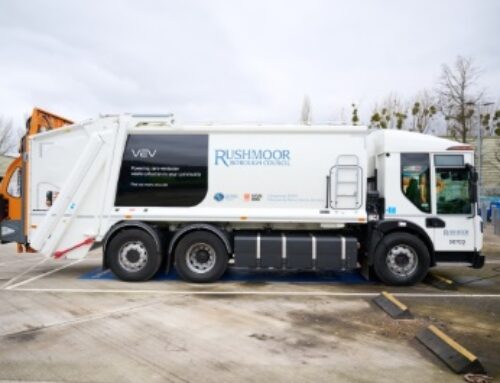MAN of the moment
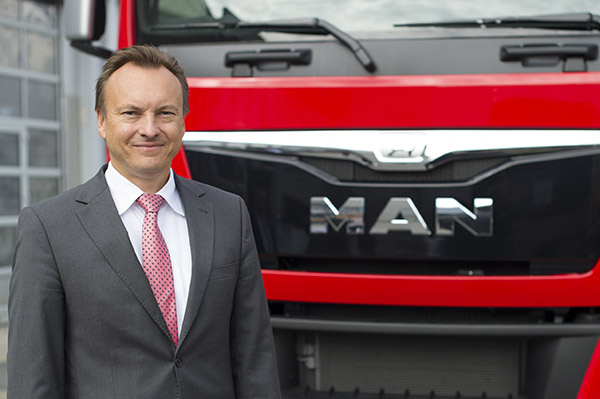 In an exclusive interview with Transport Operator, MAN Truck & Bus UK managing director Thomas Hemmerich spoke to Richard Simpson about the truck industry’s recovery from Covid’s impact, and its transition to a low-carbon future
In an exclusive interview with Transport Operator, MAN Truck & Bus UK managing director Thomas Hemmerich spoke to Richard Simpson about the truck industry’s recovery from Covid’s impact, and its transition to a low-carbon future
The combination of the Covid crisis and a last-minute Brexit deal created a perfect storm for the truck industry, according to the managing director of MAN Truck & Bus UK, Thomas Hemmerich. General economic uncertainty and global disruption to the supply chain took their toll and new truck sales slid by one-third to just under 33,000 last year (Transport Operator 96).
But this has its upside, he admits, as demand for transport, as opposed to demand for new trucks, remained healthy: “Normally we have too many used vehicles to dispose of. But this year, January and February have seen demand for used vehicles at its highest for 25 years. A shortage of stock of used vehicles is now an issue, it is difficult for us to meet demand.”
Demand for new vehicles is now healthy again, he reports.
“The first 10 – 12 weeks of the year have seen high demand, continuing and accelerating a trend from the second half of last year when demand was also recovering.
“We entered the year expecting to see a total UK market of 33,000 vehicles, about the same as 2020. But already we have revised that, and since January we are now saying 36,000 – 37,000.
“However, we have to drive on a month-to-month basis at longest: we know the situation can change in a month or even a week. For instance, confidence could be set back if the reopening of schools causes another serious Covid outbreak.”
 Looking ahead, he points out that the industry now faces the introduction of the Euro VI-E emissions regulation in January next year. He points to it as just one of a series of upcoming changes and challenges, as the industry decarbonises.
Looking ahead, he points out that the industry now faces the introduction of the Euro VI-E emissions regulation in January next year. He points to it as just one of a series of upcoming changes and challenges, as the industry decarbonises.
“The OEMs must contribute to sustainability targets and reduce CO2. It’s not just the vehicles themselves, we also have to introduce sustainable production to contribute to global reductions in CO2 output. Our factory in Munich, for example, is producing power sustainably.
“Euro VI-E standard is defined by law, but for the manufacturers meeting it is not a question of cost, but one of responsibility.”
Ahead of that, London’s Direct Vision Standard is a current legal issue.
“It’s a hot potato,” he says. ”Most customers are raising the question, and want something of at least a three-star rating. I believe TfL has issued 90,000 permits already. Our preferred solution is a retrofit ‘safe-system’ with cameras and screens. DVS is now mentioned on all the invitations to tender that we get when major fleets are seeking to acquire new vehicles.
“We now also get asked for help from MAN’s market companies abroad in nearby countries like Holland, as some of their customers need to bring trucks to London too.”
In the light of the success being enjoyed by Volvo, does he wish MAN had a gas truck engine it could offer UK customers?
“We have a very successful gas engine in the citybus market,” he counters. “In fact, it is the market leader in Scandinavia.
“As a truck salesman, I wish we could offer our customers everything. But before my time here in the UK, MAN was a pioneer of gas buses in the British market, and I understand that although the technology was successful, the operators were reluctant to invest in the infrastructure.
“And a couple of years ago, MAN decided to focus on electrical power as investment in that infrastructure was inevitable.”
Of all the mainstream truck manufacturers, MAN has made the most strides with electric power in the UK… albeit with a van.
 “We have 100 electric vehicles in the form of the TGE van, in service with DPD in the UK for six months now,” he asserts.
“We have 100 electric vehicles in the form of the TGE van, in service with DPD in the UK for six months now,” he asserts.
“They have been in service for six months, and they don’t miss a beat. We are now getting more orders for TGEs in the UK, and some inquiries even from retail customers who want only one or two vans.
“The DPD order was very good for us as they have spread the vehicles out with depots across the UK. This has encouraged us to make all our workshops capable of handling electric vehicles, an important step as we see the future CV market of the next 10 years as having three key factors: autonomy, digital connectivity and electrical or alternative drivelines.
“Electrics in particular will change workshop business models. Workshops will still be needed but mechanical technicians will increasingly be replaced by electronics technicians. This will happen quicker than most people think.
“The job description will be rotated 100 per cent, and the workload will be less. Instead of changing clutches and turbochargers, they will be testing and replacing sensors and electronic units. The standard workshop times required by each vehicle will be less than it is now.”
Questions have been raised about MAN’s position within the Traton Group, as the industry transitions away from diesel, in particular Scania’s announcement that its battery factory would not supply MAN (Transport Operator 95).
“We are cooperating with Scania at the highest level,” Thomas Hemmerich asserts. “The policy is to develop common drivelines, then give each its own character… just as the VW parent group does with passenger cars.
“Each brand retains its own characteristics, but if you join forces on the technicalities you can absorb the costs of for example, going from Euro III to Euro VI in a relatively short time. You can also find savings in logistics, for instance. These partnerships have helped MAN to stay in the marketplace and remain competitive.”
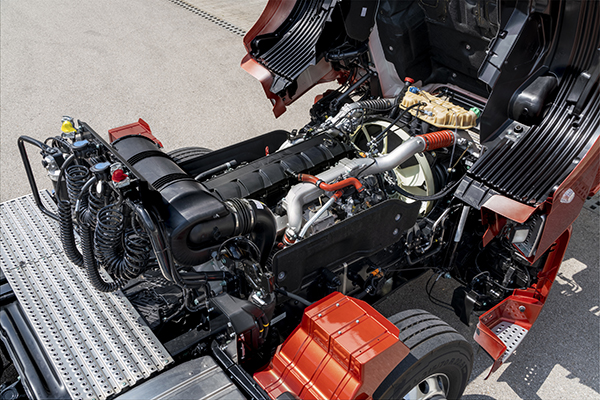 Meanwhile, he points to the success of the D15 nine-litre engine that was launched in 2018 in the truck, coach and bus markets as an example of MAN being able to produce unique innovative products in-house in a segment where some other major manufacturers are turning to Tier One suppliers.
Meanwhile, he points to the success of the D15 nine-litre engine that was launched in 2018 in the truck, coach and bus markets as an example of MAN being able to produce unique innovative products in-house in a segment where some other major manufacturers are turning to Tier One suppliers.
And here in the UK, MAN continues to drive expansion of its dealer network: both owned and private capital. Most recently it took over the five outlets and a customer workshop in the Midlands and north that had previously been owned by long-standing MAN and ERF dealer HRVS, a new dealerpoint was opened in Gateshead in 2020, and a new building will replace existing facilities in Stockton this year.









